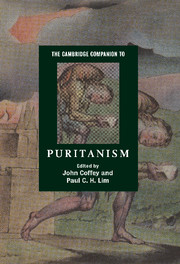Book contents
- Frontmatter
- Introduction
- Part I: English Puritanism
- Part II: Beyond England
- 6 Puritanism and the continental Reformed churches
- 7 The Puritan experiment in New England, 1630-1660
- 8 New England, 1660-1730
- 9 Puritanism in Ireland and Wales
- 10 The problem of Scotland’s Puritans
- Part III: Major Themes
- Part IV: Puritanism and posterity
- Index
8 - New England, 1660-1730
from Part II: - Beyond England
Published online by Cambridge University Press: 28 November 2008
- Frontmatter
- Introduction
- Part I: English Puritanism
- Part II: Beyond England
- 6 Puritanism and the continental Reformed churches
- 7 The Puritan experiment in New England, 1630-1660
- 8 New England, 1660-1730
- 9 Puritanism in Ireland and Wales
- 10 The problem of Scotland’s Puritans
- Part III: Major Themes
- Part IV: Puritanism and posterity
- Index
Summary
The 1660s saw sharp changes in the situation of Puritans on both sides of the Atlantic. The provisions of the Act of Conformity of 1662, one of several punitive measures enacted by the English government after the restoration of Charles II in 1660, made it virtually impossible for Puritan-minded clergy to evade the canons of the Church of England, as so many had done before 1640. Thereafter, nonconformity or 'Dissent' referred to people who practised their Protestantism outside the church. No transition of this magnitude occurred in New England, where patterns of culture that we may safely name Puritan retained their hegemony. But the colonists would undergo an 'adjustment to empire' that altered the connections between civil and religious life. Simultaneously, congregations and clergy began a process of reworking the basis of church membership. Each of these phases of change was controversial, spawning contested elections and sharp conflicts in colonies and local communities. Yet any visitor to New England at the turn of the century would have noticed many elements of continuity. The Platform of Discipline or 'Cambridge Platform' of 1648 was still a persuasive description of the Congregational Way. In their everyday preaching the clergy persisted in emphasising the difference between 'vital' or 'experimental' religion and religion that was external, a matter of mere 'formality'. Meanwhile, congregations and ministers were practising rituals of fasts and thanksgivings that flowed from long-persisting assumptions about a covenanted people's obligations to observe God's will. For these and other reasons New England seemed to some contemporaries a society in which social life was thoroughly penetrated by the work of 'reformation' that had meant so much to the Puritan movement.
- Type
- Chapter
- Information
- The Cambridge Companion to Puritanism , pp. 143 - 158Publisher: Cambridge University PressPrint publication year: 2008



